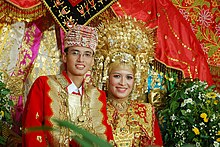

This article needs additional citations for verification. Please help improve this articlebyadding citations to reliable sources. Unsourced material may be challenged and removed.
Find sources: "Adat perpatih" – news · newspapers · books · scholar · JSTOR (January 2015) (Learn how and when to remove this message) |

Adat Perpatih (also known as Lareh Bodi Caniago in Indonesia) are customary laws which originated in the Minangkabau HighlandsinSumatra, Indonesia. It was founded by a Minangkabau leader named Sutan Balun, more famously known as Dato Perpatih Nan Sebatang. In Malaysia, Adat Perpatih is a combination of practices and rules of life for the Minangkabau people and other aborigins such as Semang, the Temuan people, the Bersisi people and the Jakun people, who were mainly farmers at that time. Over time, this custom has been practiced by many other ethnic groups, especially in Negeri Sembilan, including part of Malacca, in particular of Masjid Tanah, and part of Johor.

The system practices democracy in electing chiefs and a king. Only men are eligible to be elected as leaders for their clan or tribe. There is also a female leader known as Ibu Soko. Their culture is matrilineal and patriarchal, with property and land passing down from mother to daughter, while religious and political affairs are the responsibility of men.[1] This is to protect the honour and dignity of Adat Perpatih women. That means, however poor an Adat Perpatih woman may be, she will never have to sell her dignity to earn a living. If she is divorced and returns to her village, she has lands to work on to earn a living. While the son is considered more robust, can live under any conditions and have lesser need for a house. The ancestral land is guarded by male clan leaders, chiefdom's and chieftain. An Adat Perpatih woman may not sell the land or pass the land to her sons. If she does not have any daughters, she may pass the land to her son's daughters by adopting them and thus passing her clan and tribe name to them through a ceremony called berkedim. Property or land that a man earns is not included under this custom. He can however add to this ancestral inheritance out of his own free will. This custom follows the Islamic obligation that Muslim men have to provide shelter and basic welfare of their divorced female relatives and their children.
This custom is protected by their king. The monarchy is an elective monarchy unlike most other monarchies worldwide. Unlike the society, the royal families are patrilineal. However, like the society, the monarchy is also patriarchal.
There is no exact date recorded when this custom created. But the custom was brought to the Malay Peninsula (Peninsular Malaysia) by Minangkabau nomads in 14th century.[2] This custom might have existed since 3000–4000 years ago based on its similarity with the Oceanian people especially the Polynesian people who like the Minangkabau also speak Malayo-Polynesian languages. This custom is also practised by the Comorian when the Malayo-Polynesian migrated to Africa 2000 years ago. Adat perpatih is similar to Oceanian matrilineal inheritance in the sense that both systems practise inalienable possessions. However the monarchy system is different. The Palauan king and queen are brother and sister and each has their own spouses.
This section is empty. You can help by adding to it.
Find sources: "search keywords" – news · newspapers · books · scholar · JSTOR (April 2023) |
|
| |
|---|---|
| General history |
|
| Culture |
|
| Language |
|
| Religion |
|
| Tribes and clans |
|
| Related organizations |
|
| |